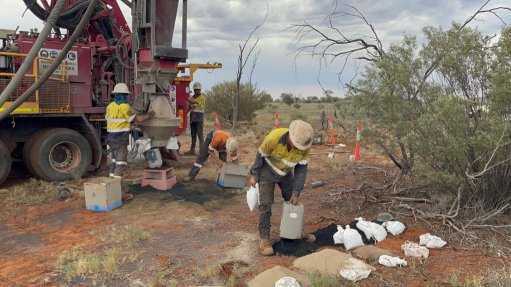MCA welcomes EPBC Act reform suggestions
PERTH (miningweekly.com) – The Minerals Council of Australia (MCA) has welcomed the final report of an independent review of the Environment Protection and Biodiversity Conservation (EPBC) Act, saying it would help guide reforms to secure a better environment, more jobs and a faster economic recovery.
The report, completed by Professor Graeme Samuel and tabled in Parliament on Thursday, found that Australia’s natural environment was in an overall state of decline and under increasing threat, facing pressures from land-use changes, habitat loss and degradation, feral animals and invasive plant species.
The report found that the current EPBC Act was ineffective and does not enable the Commonwealth to effectively protect environmental matters that are important for the nation, and was not fit to address current or future environmental challenges.
Samuel suggested that new national environmental standards should be the centrepiece of fundamental reform of national environmental law, to ensure that all decisions clearly track towards improved environmental and heritage outcomes.
The report also argued that National Environmental Standards would support greater integration of Commonwealth, state and territory environmental responsibilities.
Samuel also recommended that in a second tranche of reforms, the EPBC Act should be amended to deliver more effective environmental protection and management, accelerate achievement of the environmental outcomes and improve the efficiency of National Environmental Standards.
Furthermore, to harness the value and recognise the importance of Indigenous knowledge, the EPBC Act should require decision-makers to respectfully consider Indigenous views and knowledge, and that the Department of Agriculture, Water and the Environment should take immediate steps to invest in developing its cultural capability to build strong relationships with Indigenous Australians and enable respectful inclusion of their valuable knowledge.
The report also recommended that legislative reforms should be redrafted in line with modern, best practice drafting guidance, and that the Commonwealth government should increase the transparency of the operation of the EPBC Act.
MCA CEO Tania Constable said on Thursday that timely approvals, greater national cooperation and clearer guidelines would help Australia’s minerals industry create more jobs, boost investment and improve national biodiversity and heritage outcomes.
“The report emphasises the need to address duplicative and unnecessarily complex regulation which delays projects and the investment that supports regional communities and local businesses.
“Importantly, the report recognises the importance of greater inclusion of Aboriginal and Torres Strait Islander views and knowledge in regulatory processes. The industry supports the recommendations to modernise and coordinate Indigenous cultural heritage protection across Australia.”
Constable said that a focus on clear, effective and outcomes-based regulation would provide certainty for businesses, the community and decision-makers, achieving the high national environmental and heritage standards Australians expect.
“In line with the report’s recommendations, National Cabinet’s commitment to develop ‘single touch’ bilateral assessment and approvals – supported by National Environmental Standards – will provide strong environmental protection and the certainty businesses need to invest more in Australia’s regions. Robust assurance arrangements will provide community confidence the standards are being met,” Constable said.
The review recommends pragmatic reforms to address the unnecessary duplication of state regulation for uranium mining and water management for coal projects.
The report recommends an innovative central fund to coordinate environmental investment including offsets, which, alongside a national environmental dataset, will support habitat restoration and strategic biodiversity outcomes.
“Australia’s minerals sector is committed to the protection and restoration of our unique environment and national heritage values.
“The industry looks forward to ongoing engagement with government and other stakeholders as the review recommendations are considered, and reforms to improve national environmental law are progressed,” Constable added.
Article Enquiry
Email Article
Save Article
Feedback
To advertise email advertising@creamermedia.co.za or click here
Announcements
What's On
Subscribe to improve your user experience...
Option 1 (equivalent of R125 a month):
Receive a weekly copy of Creamer Media's Engineering News & Mining Weekly magazine
(print copy for those in South Africa and e-magazine for those outside of South Africa)
Receive daily email newsletters
Access to full search results
Access archive of magazine back copies
Access to Projects in Progress
Access to ONE Research Report of your choice in PDF format
Option 2 (equivalent of R375 a month):
All benefits from Option 1
PLUS
Access to Creamer Media's Research Channel Africa for ALL Research Reports, in PDF format, on various industrial and mining sectors
including Electricity; Water; Energy Transition; Hydrogen; Roads, Rail and Ports; Coal; Gold; Platinum; Battery Metals; etc.
Already a subscriber?
Forgotten your password?
Receive weekly copy of Creamer Media's Engineering News & Mining Weekly magazine (print copy for those in South Africa and e-magazine for those outside of South Africa)
➕
Recieve daily email newsletters
➕
Access to full search results
➕
Access archive of magazine back copies
➕
Access to Projects in Progress
➕
Access to ONE Research Report of your choice in PDF format
RESEARCH CHANNEL AFRICA
R4500 (equivalent of R375 a month)
SUBSCRIBEAll benefits from Option 1
➕
Access to Creamer Media's Research Channel Africa for ALL Research Reports on various industrial and mining sectors, in PDF format, including on:
Electricity
➕
Water
➕
Energy Transition
➕
Hydrogen
➕
Roads, Rail and Ports
➕
Coal
➕
Gold
➕
Platinum
➕
Battery Metals
➕
etc.
Receive all benefits from Option 1 or Option 2 delivered to numerous people at your company
➕
Multiple User names and Passwords for simultaneous log-ins
➕
Intranet integration access to all in your organisation


















